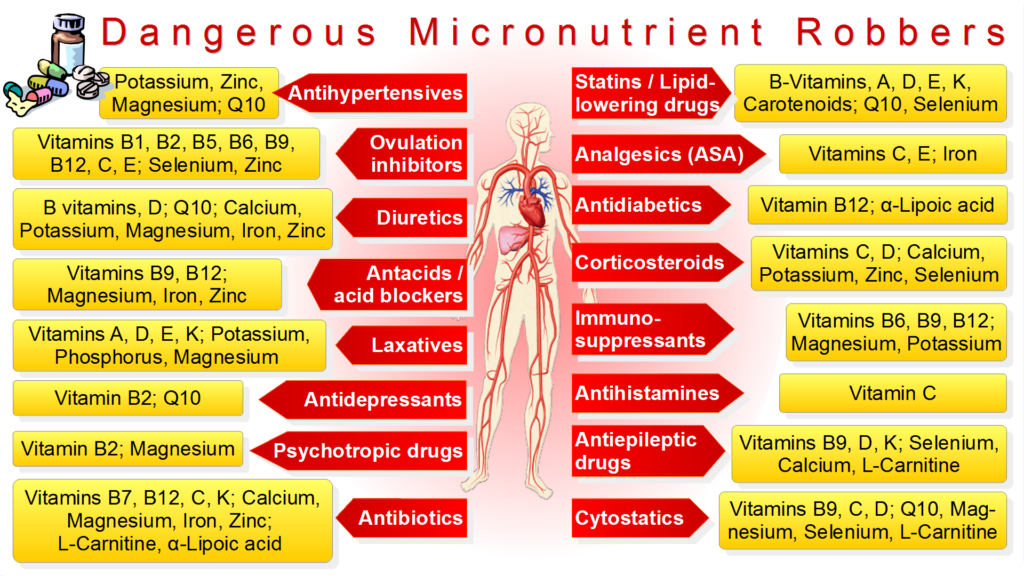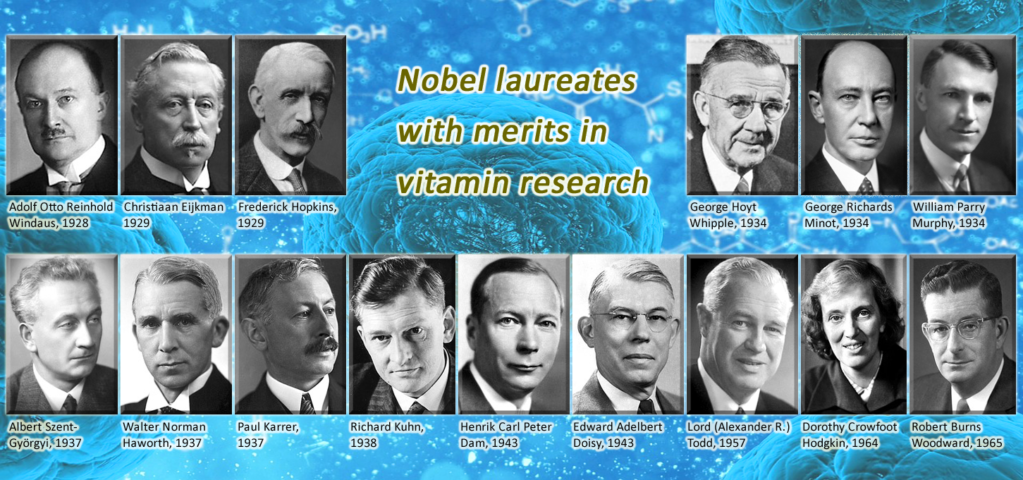In the first part of this article, we mentioned various mechanisms through which drugs can induce or aggravate a deficit of micronutrients. In the following, we want to shed more light on why an optimal supply of those vital cellular nutrients is so significant for maintaining or restoring health.
In fact, a chronic deficiency of micronutrients is the most common cause of cellular dysfunctions and, thus, the main cause of widespread diseases with serious consequences, such as cardiovascular diseases, cancer, diabetes, osteoporosis, arthritis, arthrosis, rheumatic and other conditions. Conversely, fundamental prerequisites for the prevention of such diseases are a healthy, preferably plant-based diet, including a targeted supply of micronutrient synergies, as well as a healthy lifestyle with sufficient exercise, the reduction of stress, and especially the avoidance of consumer toxins (tobacco, alcohol, questionable additives in food, etc.).
In contrast to synthetic, patented drugs, micronutrients are natural substances that billions of our body cells need continuously for life and optimal function. They include vitamins, vitaminoids, minerals, trace elements, amino acids, and a wide range of bioactive plant substances. They fulfill essential tasks in the metabolic process, such as:
- in the provision of bioenergy (ATP production) in billions of cells,
- in the formation and stabilization of connective tissue,
- in protecting cells from damage by free radicals,
- for the optimal functioning of all metabolic processes inside and outside the cells.
Cells require bioenergy carriers or biocatalysts for a large number of vital biochemical reactions. Consequently, these molecules can be understood as ‘igniters of cell metabolism’. Without them, countless mitochondria (the power plants of the cells) would not be able to utilize the macronutrients provided (carbohydrates, fats, proteins). Many of these biocatalysts must be supplied to the body from the outside through food. This must be done not only regularly but in optimal dosage and synergy. Otherwise, deficiencies can easily occur in the cells, followed by malfunctions in the organs and, finally, more or less serious diseases.
The consequences of taking medication can be correspondingly severe, depending on the type and intensity of the disruption to the micronutrient balance. Significant impairment is to be expected especially in the case of long-term drug use and when several drugs are combined. The most common side effects include:
- mitochondrial dysfunctions, culminating in the death of mitochondria,
- decrease in performance, chronic fatigue, exhaustion syndrome, increased irritability,
- increased tendency to inflammation,
- blood formation disorders,
- impaired immune defense, increased susceptibility to infections, etc.,
- neurological disorders (insensitivity, tingling, numbness, paralysis, pain; increased sensitivity to light and sound, etc.),
- increased homocysteine concentrations (due to insufficient degradation),
- cardiovascular diseases (arteriosclerosis, increase in blood pressure, cardiac arrhythmia, heart attack, stroke),
- water retention in tissues,
- reduced liver and/or kidney activity, permanent damage up to the development of cancer,
- digestive disorders due to impairment of the intestinal biota.
Latent micronutrient deficiencies in almost all groups of people, urgent replenishment of micronutrient deficiencies required
In their classic reference book, The Drug-Induced Nutrient Depletion Handbook, Ross Pelton, PhD, and his coauthors pointed out one of the pharmaceutical industry’s biggest secrets: that drugs deprive the body of vitamins, minerals and other essential micronutrients. Pelton and his colleagues evaluated 459 peer-reviewed studies and identified about 150 classes of drugs that cause nutrient depletion in the body. “Many of the side effects from drug therapy may not be directly due to the drug itself, but rather are the result of nutritional deficiencies that are caused by the drug when taken over time”, Pelton and his team suggested over twenty years ago.
Little has happened since then. It would be easy to remedy the undesirable effects of drugs. Nevertheless, this realization has unfortunately hardly been considered in orthodox medicine to this day. In this pharma-oriented healthcare system, the expansion of the billion-dollar business with disease is obviously more important than the well-being of patients.

The “success” of this profit-driven pharmaceutical medicine is reflected in the mortality statistics. Led by death rates due to cardiovascular diseases and cancer, the fatal effects of prescription drugs actually rank third – mind you, in countries with highly developed healthcare systems! Adverse drug reactions account for between three and seven percent of hospital admissions in Germany. The number of a quarter of a million drug-related hospitalizations per year reported in 2018 is likely to be far understated in terms of actual cases of preventable, drug-related side effects in patients. Is this the “medical-technical progress” whose constantly rising costs must be covered by the citizens? It is high time to replace this inhumane health maintenance system with a real health care system!
How this can be achieved is obvious thanks to scientifically based natural healing research. Instead of exploiting diseases as a business field to serve the investment interests of an industry, we believe that there must be a drive toward eliminating diseases in modern health care. The primary goal is, therefore, cause-oriented therapy and effective prevention. A healthy diet with an optimal supply of micronutrients is fundamental to this. Numerous studies prove that with the help of specifically supplemented micronutrient combinations, formulated according to the principle of synergy, it is possible to overcome diseases more quickly – without drugs and their harmful side effects. If, in exceptional cases, pharmaceuticals are necessary, it is all the more urgent to immediately compensate for the micronutrient deficiencies they cause.






